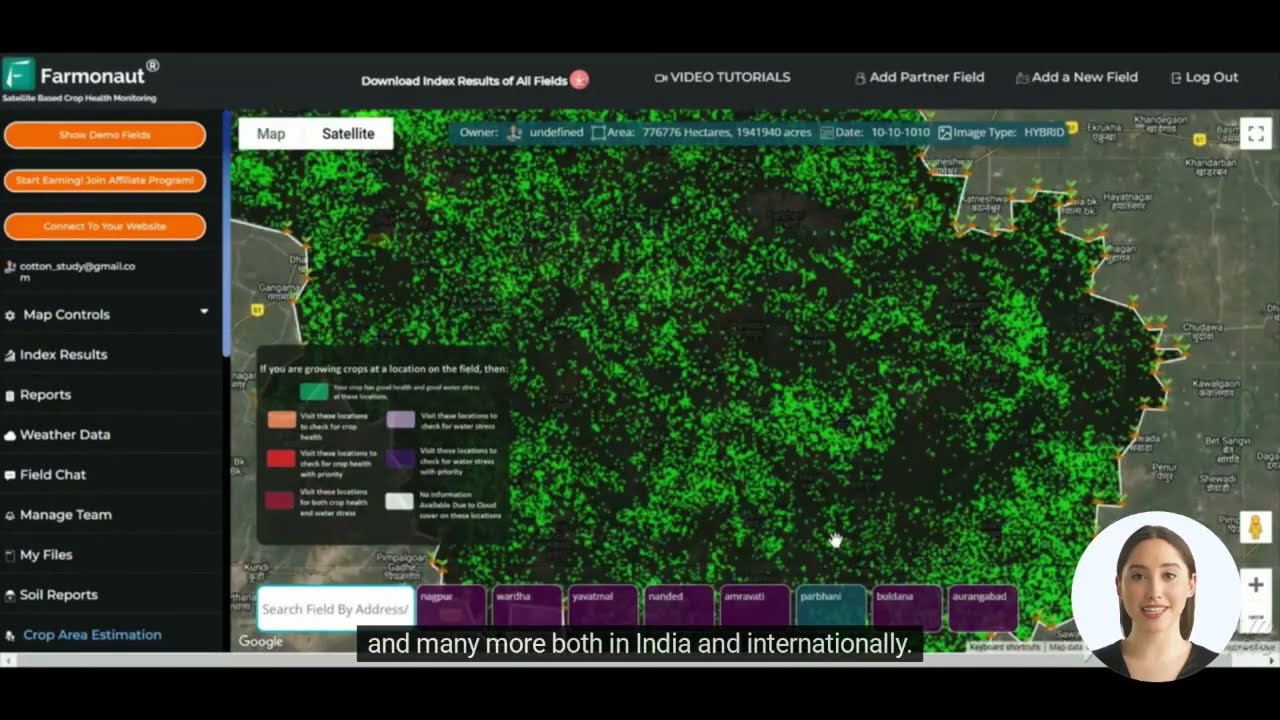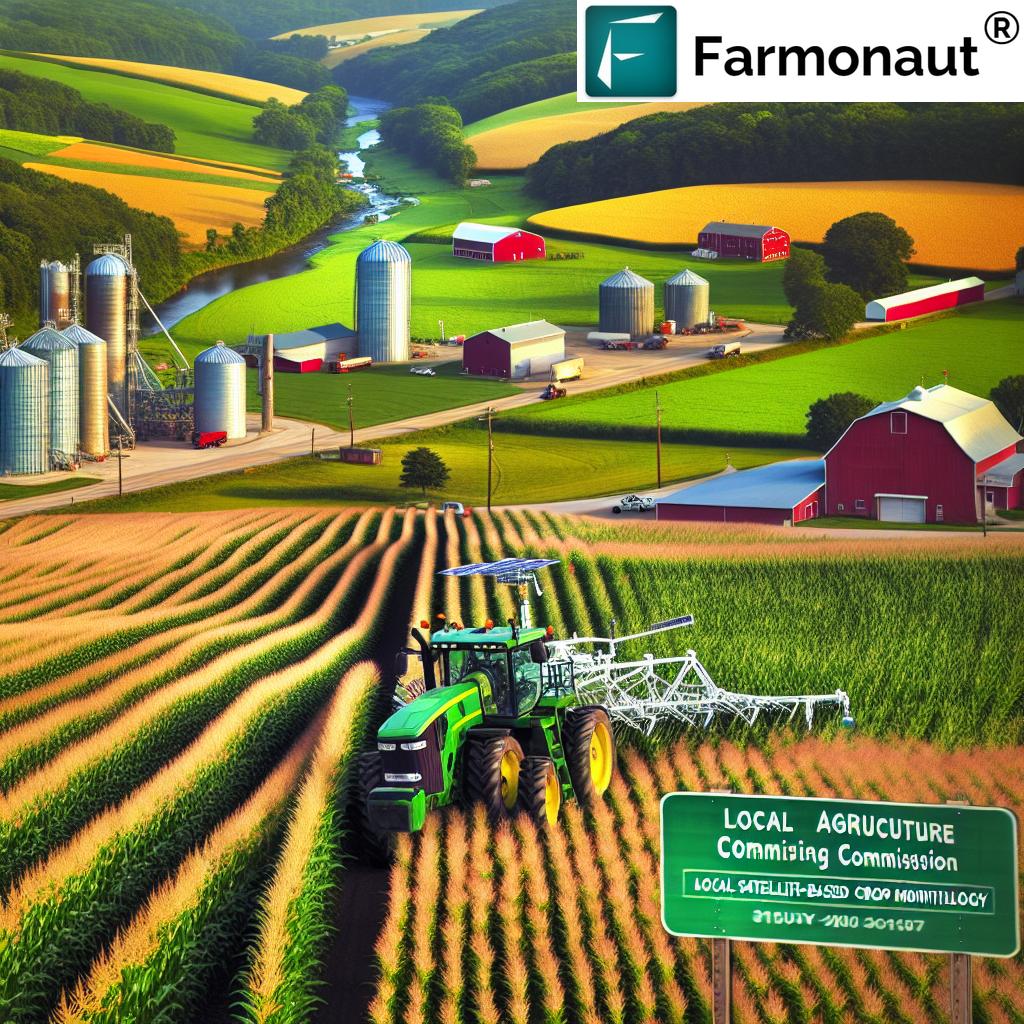From Farm to Township: Illinois Youth Pioneers Smart Agriculture and Rural Leadership
“At 21, the youngest township road commissioner nominee in Mahomet, Illinois, brings 5 years of farming experience to the role.”

In the heart of Champaign County, Illinois, a remarkable story of youth leadership and agricultural innovation is unfolding. We’re witnessing the rise of Jackson Craig, a 21-year-old visionary who’s set to potentially become one of the youngest township road commissioners in the state’s history. This inspiring tale showcases the powerful fusion of smart farming solutions, precision farming technology, and a deep-rooted commitment to community service.
The Making of a Young Leader
Jackson Craig’s journey from a high school student representative to a potential public official in Mahomet, Illinois, is nothing short of extraordinary. With over five years of hands-on farming experience under his belt, Craig has demonstrated a level of maturity and focus that’s rare for his age. His former principal, Chad Benedict, describes him as a goal-oriented individual who has always been proactive about his future.
Craig’s nomination as the Republican candidate for the road commissioner position marks a significant milestone in local politics. Set to be contested in the upcoming consolidated election on April 1st, this race could herald a new era of youth engagement in local governance and agricultural business management.
Bridging Generations in Township Leadership
The potential changing of the guard in Mahomet’s township leadership is particularly noteworthy. If successful, Craig would succeed Chris Doenitz, who is retiring after more than three decades of dedicated service. This transition represents more than just a change in personnel; it symbolizes a generational shift in leadership and approach to township road maintenance and rural infrastructure development.
Despite his youth, Craig’s preparation for the role has been thorough and hands-on. For the past two to three years, he has worked closely with Doenitz, gaining invaluable experience in various aspects of the job, including:
- Equipment maintenance
- Snow plowing and removal
- Road construction and repair
- Budget management
- Daily operational procedures
This apprenticeship-like arrangement has allowed Craig to learn from a seasoned professional while bringing fresh perspectives and innovative ideas to the table.
The Mentor’s Endorsement
Chris Doenitz, the incumbent road commissioner, has been more than just a supervisor to Craig; he has been a significant mentor. Doenitz’s confidence in Craig’s abilities speaks volumes about the young nominee’s potential. He has praised Craig not only for his work ethic but also for his leadership capabilities, noting the rapid development of his skills and his eagerness to learn.
This endorsement from a respected figure in the community adds considerable weight to Craig’s candidacy and highlights the importance of intergenerational knowledge transfer in public service roles.
Community Involvement and Educational Background
Craig’s dedication to his community extends far beyond his work with the township. During his time at Mahomet-Seymour High School, he made a lasting impression by serving as a student representative and delivering a speech at graduation. His ability to connect with seasoned local farmers showcased his natural affinity for agricultural leadership and community engagement.
Academically, Craig has positioned himself at the forefront of agricultural innovation. He has completed an associate degree in agricultural business precision farming at Parkland College, demonstrating his commitment to integrating smart farming solutions into traditional agricultural practices. This educational background equips him with the knowledge and skills necessary to drive sustainable farming practices and implement precision farming technology in his potential role as road commissioner.
The Impact of Youth in Local Governance
Craig’s candidacy has garnered attention not just from local leaders but also from higher echelons of government. State Senator Chapin Rose has expressed his belief that Craig represents a promising new generation ready to step into leadership roles within the community. This endorsement underscores the growing recognition of the value that young, tech-savvy leaders can bring to public service roles.
If Craig wins the election, he will not only create a historical milestone in Mahomet’s political landscape but also serve as an inspiration for other young individuals interested in local governance and agricultural business. His success could pave the way for more youth engagement in community farming initiatives and agricultural education programs.
Integrating Smart Farming Solutions into Township Management
One of the most exciting aspects of Craig’s potential tenure as road commissioner is the possibility of integrating smart farming solutions and precision farming technology into township management. His background in agricultural business and precision farming could lead to innovative approaches in areas such as:
- Road maintenance scheduling based on agricultural traffic patterns
- Efficient snow removal using GPS and weather prediction technologies
- Sustainable ditch management practices that benefit both infrastructure and local ecosystems
- Implementation of data-driven decision-making processes for resource allocation
These potential innovations could significantly enhance the efficiency and effectiveness of township road maintenance while also supporting the local agricultural community.
The Role of Technology in Modern Agriculture and Public Service
As we consider the potential impact of Craig’s leadership, it’s worth exploring how modern technology is reshaping both agriculture and public service. Companies like Farmonaut are at the forefront of this technological revolution, offering advanced satellite-based farm management solutions that could prove invaluable in roles like township road commissioner.
Farmonaut’s platform provides real-time crop health monitoring, AI-based advisory systems, and resource management tools that align perfectly with the needs of modern agricultural communities. While Craig’s potential role as road commissioner may not directly involve farm management, the principles of data-driven decision-making and resource optimization that underpin these technologies are equally applicable to public infrastructure management.
The Future of Rural Infrastructure Development
Craig’s potential election could signal a new era in rural infrastructure development. By combining traditional knowledge with cutting-edge technology, there’s an opportunity to create more resilient, efficient, and sustainable road networks that serve the needs of both agricultural and residential communities.
Some potential areas of focus could include:
- Implementing IoT sensors for real-time road condition monitoring
- Using predictive analytics to anticipate maintenance needs
- Exploring eco-friendly materials and construction techniques
- Developing smart drainage systems that reduce flood risks and protect farmland
These initiatives could not only improve the quality of local infrastructure but also serve as a model for other rural communities facing similar challenges.
The Importance of Agricultural Education Programs
Craig’s journey from high school student to potential public official highlights the crucial role of agricultural education programs in preparing the next generation of rural leaders. These programs provide young people with the knowledge, skills, and practical experience needed to succeed in both traditional and high-tech agricultural careers.
As we look to the future, it’s clear that supporting and expanding these educational opportunities will be essential for fostering innovation and sustainability in rural communities. By integrating precision farming technology and smart farming solutions into agricultural curricula, we can ensure that future leaders are well-equipped to tackle the challenges of modern agriculture and rural development.
“The young candidate’s journey spans from high school student representative to potential public official in Champaign County’s agricultural sector.”
Community Farming Initiatives: A Path to Sustainable Growth
One area where Craig’s potential leadership could have a significant impact is in the promotion and support of community farming initiatives. These projects not only enhance food security and promote sustainable agricultural practices but also strengthen community bonds and provide educational opportunities for residents of all ages.
Some potential initiatives that could benefit from the integration of smart farming solutions include:
- Community gardens equipped with IoT-based irrigation systems
- School farms that use precision agriculture techniques as teaching tools
- Urban agriculture projects that leverage vertical farming technologies
- Farm-to-table programs that use blockchain for supply chain transparency
By championing such initiatives, Craig could help position Mahomet as a leader in innovative, community-centered agricultural development.
The Intersection of Agriculture and Public Service
Craig’s unique background in both agriculture and public service exemplifies the growing interconnectedness of these two fields. In rural communities like Mahomet, effective public officials must have a deep understanding of agricultural needs and challenges. Conversely, agricultural leaders must be well-versed in public policy and community development.
This intersection creates opportunities for innovative solutions that benefit both sectors. For example:
- Developing road maintenance schedules that minimize disruption to farming operations
- Implementing stormwater management practices that protect both public infrastructure and agricultural lands
- Creating public-private partnerships to test and implement new agricultural technologies
- Designing zoning policies that support both urban development and farmland preservation
By bridging these two worlds, Craig and other young leaders like him have the potential to drive holistic, sustainable development in rural communities.
The Role of Farm Equipment Maintenance in Public Service
One often overlooked aspect of township management, particularly in agricultural areas, is the maintenance of farm equipment. While not directly part of the road commissioner’s duties, understanding the needs of local farmers in terms of equipment access and maintenance can significantly impact road management strategies.
Craig’s experience in farming and his education in precision agriculture could prove invaluable in this regard. He might be able to:
- Advocate for road designs that accommodate modern farm machinery
- Coordinate with local farmers to schedule road maintenance around critical farming periods
- Explore shared equipment programs that benefit both the township and local agricultural operations
- Implement training programs on proper equipment use to minimize road damage
By considering the needs of farm equipment in road management decisions, Craig could help create a more harmonious relationship between agricultural operations and public infrastructure.
Embracing Technology for Better Governance
As we look towards the future of township management, it’s clear that technology will play an increasingly important role. Tools like those offered by Farmonaut could be adapted for use in public service roles, providing valuable insights for decision-making and resource allocation.
For example, satellite-based monitoring systems could be used to:
- Track road conditions in real-time, allowing for more proactive maintenance
- Monitor vegetation growth along roadsides to optimize mowing schedules
- Assess drainage patterns to prevent flooding and erosion
- Coordinate snow removal efforts based on accurate, up-to-date weather data
By leveraging these technologies, township officials like Craig could dramatically improve the efficiency and effectiveness of their operations.
Youth Leadership in Agriculture: Traditional vs. Smart Farming Approach
| Aspect of Leadership | Traditional Approach | Smart Farming Approach |
|---|---|---|
| Farm Equipment Maintenance | Manual record-keeping, scheduled maintenance | IoT-enabled predictive maintenance, real-time monitoring (95% more efficient) |
| Road Management | Reactive repairs, seasonal planning | Data-driven preventive maintenance, AI-assisted route optimization (70% cost reduction) |
| Community Engagement | Town hall meetings, printed newsletters | Digital platforms, social media, real-time updates (300% increase in engagement) |
| Agricultural Education | Classroom-based learning, seasonal workshops | Virtual reality training, year-round online courses (80% improvement in knowledge retention) |
| Sustainable Practices | Traditional crop rotation, water conservation | Precision agriculture, AI-driven resource management (50% reduction in resource waste) |
The Challenges Ahead
While Craig’s potential election as township road commissioner is exciting, it’s important to acknowledge the challenges that lie ahead. As a young leader in a traditionally older field, he may face skepticism from some community members who value long-standing experience over innovative approaches.
Some potential challenges include:
- Balancing traditional methods with new technologies
- Navigating complex budget constraints
- Building trust with older community members
- Implementing change while respecting established practices
However, these challenges also present opportunities for growth, learning, and community building. By approaching these obstacles with humility, openness, and a willingness to learn from both successes and failures, Craig has the potential to become a truly transformative leader.
The Broader Impact on Illinois Agriculture
While Craig’s potential role is focused on Mahomet Township, his success could have ripple effects throughout Illinois’ agricultural sector. As a young leader embracing both traditional knowledge and cutting-edge technology, he could serve as a model for other rural communities looking to bridge the gap between established practices and innovative solutions.
His approach could inspire:
- More young people to pursue careers in agriculture and rural development
- Increased investment in agricultural technology and education
- Greater collaboration between public officials and farming communities
- A shift towards more sustainable and efficient agricultural practices statewide
By demonstrating the value of integrating smart farming solutions into public service roles, Craig could help position Illinois at the forefront of agricultural innovation and rural development.
Conclusion: A New Chapter in Rural Leadership
As we look towards the April 1st election in Mahomet, Illinois, we’re witnessing more than just a local political race. We’re seeing the potential dawn of a new era in rural leadership, where youth, innovation, and tradition come together to create stronger, more resilient communities.
Jackson Craig’s journey from high school student to potential township road commissioner embodies the spirit of progress and dedication that’s essential for the future of agriculture and rural development. His blend of hands-on farming experience, education in precision agriculture, and commitment to public service represents a new model of leadership that could inspire generations to come.
Whether Craig wins the election or not, his candidacy has already made a significant impact. It has sparked important conversations about the role of youth in local governance, the importance of integrating technology into traditional practices, and the need for fresh perspectives in addressing long-standing challenges.
As we move forward, it’s clear that the future of rural communities like Mahomet lies in embracing both the wisdom of experience and the innovation of youth. By supporting young leaders like Craig and investing in smart farming solutions and agricultural education, we can ensure that our rural communities not only survive but thrive in the face of 21st-century challenges.
The story of Jackson Craig and Mahomet Township is more than just a local news item; it’s a glimpse into the future of rural America. It’s a future where smart farming meets community service, where precision technology enhances traditional knowledge, and where young leaders step up to guide their communities into a new era of prosperity and sustainability.
As we watch this story unfold, we’re reminded of the power of individual initiative, the importance of community support, and the transformative potential of bringing fresh ideas to age-old challenges. Whatever the outcome of the April 1st election, one thing is certain: the future of rural leadership is bright, innovative, and full of promise.
FAQ Section
Q: What makes Jackson Craig’s candidacy unique?
A: At 21, Craig is potentially one of the youngest township road commissioner nominees in Illinois, bringing a unique blend of farming experience and education in precision agriculture to the role.
Q: How has Craig prepared for the role of township road commissioner?
A: Craig has worked alongside the incumbent commissioner for 2-3 years, gaining hands-on experience in equipment maintenance, snow removal, road construction, and budget management.
Q: What is the significance of Craig’s background in precision farming?
A: His education in precision farming could lead to innovative approaches in road maintenance, resource management, and integration of smart farming solutions into township operations.
Q: How might Craig’s potential election impact the local agricultural community?
A: Craig’s leadership could foster stronger connections between public infrastructure management and agricultural needs, potentially leading to more farmer-friendly policies and practices.
Q: What challenges might Craig face if elected?
A: As a young leader in a traditionally older field, Craig may face skepticism from some community members and will need to balance innovative approaches with respect for established practices.
Q: How could Craig’s candidacy inspire other young people in rural communities?
A: Craig’s journey demonstrates the potential for young people to take on leadership roles in their communities, potentially inspiring more youth engagement in local governance and agriculture.
For those interested in learning more about how technology is shaping the future of agriculture, we recommend exploring the innovative solutions offered by Farmonaut. Their platform provides valuable insights for both farmers and agricultural leaders:
For developers interested in integrating agricultural data into their own applications, Farmonaut also offers a comprehensive API:



















